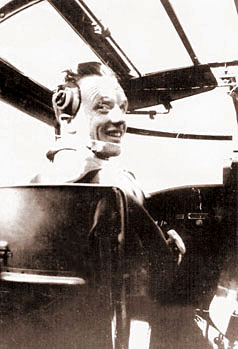
Established April 14, 1942
 |
American Ex-Prisoners of War
A not-for-profit, Congressionally-chartered veterans’ service organization advocating for former prisoners of war and their families.
Established April 14, 1942 |


Floyd A. Elliott in cockpit
|
||
| Last Name | First Name, Middle Init. | Nickname |
| Spouse | City | State, Zip |
| Conflict — Theatre | Branch of Service | Unit: |
| Military Job | Date Captured | Where Captured |
| Age at Capture | Time Interned | Camps |
| Date Liberated | Medals Received | |
| After the War ... | ||
While attending Advanced Flight School in Stockton, California he met his wife-to-be on a blind date arranged by fellow pilot candidates, John and Harry Ellingston, brothers of Lottie Jean. Red and Lottie Jean were married about 30 days later. Finishing flight school, Red was given a commission and assigned to a B-25 squadron and eventually shipped out to Greenville, South Carolina.
After assembling his B-25 crew and training with them for several weeks, the crew received orders to report to a base in North Africa. They completed 12 successful missions in the European theater, primarily targeting rail yards, bridges and other transportation structures or factories in Italy.
Red's thirteenth mission would become a fateful one. A co-pilot on another B-25 crew had become ill and Red volunteered to serve as co-pilot on this mission. Seeking a rail yard in Italy, the crew encountered heavy flak at 10,000 feet. The B-25 in which Red was co-piloting took a direct hit and the tail section was severed from the aircraft. The B-25 began a violent downward spiral and the pilot gave the order to bail out.
In the cockpit the seats became jammed and would not retract, thereby blocking the regular exit out of the aircraft for the pilot and co-pilot. The two were forced to open the glass top hatch and climb out of the spinning B-25 and make their way to the rear of the wing to jump off. Red jumped and immediately deployed his parachute. The pilot, who also immediately pulled his parachute, followed him.
Red's parachute fully opened just a few feet from the ground. The pilot's parachute did not fully deploy before he impacted the ground. Red landed into trees and the parachute completely encompassed a tree, thereby breaking his rapid fall to the ground. His toes were barely touching the ground as the parachute suspended him in air. After witnessing the devastation and tragedy that befell his fellow Americans, his disbelief that he survived the ordeal with only cuts and bruises gave him a confidence, a knowing belief that it was just not his time to die.
Reportedly, only he and one other member of the B-25 crew survived the crash. The other crewmember was able to evade the enemy and was taken in by members of the underground. He was eventually repatriated and continued to fight in the war. Red was captured by the Nazis minutes after the crash.
A Nazi patrol saw Red's parachute open and quickly searched the area, capturing him a short time later. An SS officer interrogated him for a couple of hours. Having been a last-minute substitute on this mission, he missed the pre-flight briefing. Consequently, he had no recent knowledge of any military significance, and the interrogation was eventually terminated. He was held in solitary confinement for the next three days.
Red was then put on a train, in what he described as a cattle car, with other American prisoners. He said that the cattle car was so full of people that there was no room to move. The prisoners were forced to sit toboggan style because of the overcrowded conditions and stood the rest of the time. They remained in the cattle car until they arrived at Stalag Luft 3 in Germany.
Entering the POW camp, he weighed 190 pounds. He described hardships in the camp, mostly due to lack of food. Red was not tortured or beaten during his time in the POW camp. He said that the camp in which he was held was populated primarily with aircraft officers and, although there was contempt and disdain for the enemy, for the most part they were respected as officers. He said the food they received was garbage and there was not much of that. They would on occasion receive a loaf of black bread. Red said that the taste was bitter and dry, but in comparison to the usual tree root stew and rotten vegetables they received, the bread was a treat. The prisoners became skilled at making paper-thin sliced of the bread to make it last longer. Food packages from the Red Cross were pillage before the prisoners ever saw them and the German guards kept the edibles most of the time. One year and thirteen days later, when he was finally liberated, Red weighed in at 119 pounds—he lost 71 pounds, nearly 40 percent of his total body weight.
Red was held at Stalag Luft 3 for a period of time (months). As the Russian Army approached, the POW camp was ordered evacuated and all of the prisoners made a long, cold trek to Stalag 7A. Red described miserable conditions, illness, fatigue and frostbite plaguing the POWs on this three-day march in the snow. One of the American soldiers that he befriended suffered from frostbite in both feet. The soldier was unable to walk on his own. Red says that the Nazis executed those that could not walk and would just leave their bodies along the side of the road. Consequently, Red and a couple of other POWs shared the task of carrying his friend. After three days, the soldiers were placed on train cattle cars to complete the journey.
After they'd been held at Stalag 7A for several weeks, General Patton's Army liberated the POW camp. Red recalls General Patton entering the barracks where Red was cooking his first real meal in more than a year. Patton strode into the room and someone yelled "Attention!" Red had just picked up a hot pot of beef stew off the stove and held it dearly in his hands while standing at attention, realizing that he should be saluting. Reportedly, Patton said, "You're fine soldier— eat!" A few days later, Red was on a ship out of France, headed home to the United States.
Upon his return to the States, Red considered making the Army Air Corps a career. But, the bureaucracy put an end to that idea. In order to remain in the service, soldiers were expected to receive promotion in rank at regular intervals. Being a POW for more than a year caused Red to miss out on promotional opportunities. He would likely have been a Captain or Major had it not been for his capture. Since he was a 2nd Lieutenant at the time, he was given an honorable discharge rather than an offer to remain in the Army.
Red attended medical school in Columbia, Missouri under the GI Bill and became a veterinarian. He had a successful and rewarding practice spanning 45+ years in Porterville, California where he was affectionately known as "Doc" Elliott by his numerous clients and friends. He and Lottie Jean are still married. The have four children, ten grandchildren and seven great grandchildren. AT 86, he is now retired and he and Lottie Jean live in Bakersfield, California with their eldest daughter, Donna and her husband Don.